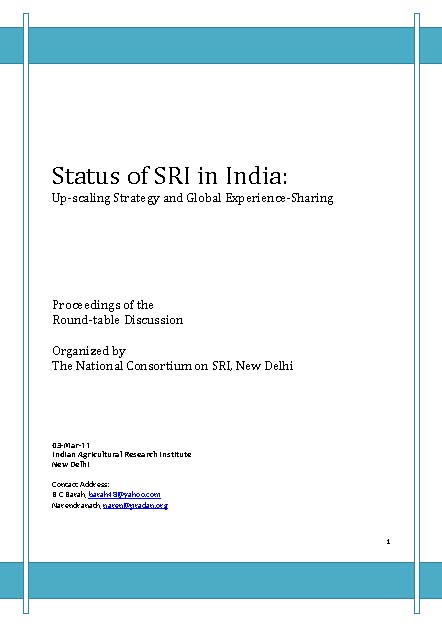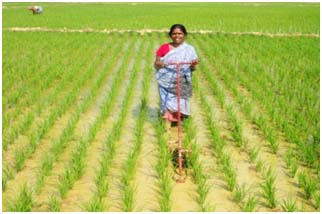 The issues of sustainable food security assume national importance, as the country is debating on the crucial National Food Security Bill. Breaking yield barrier, accelerating growth of production and ensuring sustainability are the critical policy concerns in Indian agriculture.
The issues of sustainable food security assume national importance, as the country is debating on the crucial National Food Security Bill. Breaking yield barrier, accelerating growth of production and ensuring sustainability are the critical policy concerns in Indian agriculture.
The roundtable discussion underlined the need to harness the opportunities offered by the System of Rice Intensification (SRI) and its extensions to crop production in many areas. This may help in substantially reducing the need for embedded subsidies in every grain of rice while achieving increases in yield by 15 per cent to 40 per cent or more over present conventional methods. In India about 1.7 million farmers are estimated to have adopted the technique on more than 7.5 lakh hectares across 160 districts, without any major project funding so far. Tamil Nadu and Tripura are the leading states for adoption of SRI, but many others are following suit.
SRI operates on the basis of modifying management practices (for plants, soil, water and nutrients) instead of requiring a change in variety (new seeds) or other external inputs. The methods work well with new varieties, but also farmers’ present varieties, including indigenous ones; they can be used with chemical fertilizer, but biomass amendments to the soil give best results. With SRI management, crops are usually more resistant to pests and diseases, so chemical protection is less necessary, and Integrated Pest Management protection is most compatible with SRI. The methods were developed for irrigated rice production, but are being extrapolated to upland rice and even other crops. The principles on which SRI is based are well established now by scientific evaluation.
While civil society has played important roles in taking SRI forward, government agencies in Tripura, Tamil Nadu, Orissa, Bihar, Madhya Pradesh and Andhra Pradesh with innovative extension strategies have also advanced the spread of SRI. SRI has become is a “bankable technology” supported by NABARD, as it can enhance farmers’ incomes substantially. With systematic planning and upscaling of SRI, India has the potential to become a leader in agroecological innovations.
agencies in Tripura, Tamil Nadu, Orissa, Bihar, Madhya Pradesh and Andhra Pradesh with innovative extension strategies have also advanced the spread of SRI. SRI has become is a “bankable technology” supported by NABARD, as it can enhance farmers’ incomes substantially. With systematic planning and upscaling of SRI, India has the potential to become a leader in agroecological innovations.
The relevance of the national consortium on SRI was highlighted -
- A lot is happening in the field on SRI/SCI, which should be known and shared more widely, acquiring and processing information that can be used to improve these initiatives and to inform national‐level policies and leaders.
- Despite the enormous spread of SRI/SCI in many states, India may miss the opportunity to become a world leader in agro‐ecological innovations if there is no aggregation and refinement of experience.
- Up‐scaling of SRI requires working in partnership with a variety of institutions and applying different mechanisms and modalities for extension.
- Stronger research efforts are needed, with focus on priority knowledge needs; currently not all ICAR and agricultural universities are on board, but their cooperation can be strengthened as research agendas are formulated and as results and findings are shared.
- Field‐level agencies working on SRI need greater support and recognition, sharing materials, methods and learning, particularly among farmers in the different States. In this connection various policy dissemination activities and experience sharing dialogues among the stakeholders are organized from time to time.
The roundtable put forth the need for a national program and policy on SRI and raised the following concerns -
- How to get farmers re‐oriented towards focusing on ‘management’ of their rice agro‐ecology and away from input‐centered preoccupation?
- How to establish SRI labor markets with new skills and contractual wage rates?
- How to reform irrigation systems towards better control at the farmers’ level?
- Establishing decentralised manufacturing of SRI implements and custom‐hire systems.
- Building cadres of SRI Resource Farmers.
- Mobilising organic matter/resources for improving soil productivity.
- Establishing research back‐up/support systems.
The SRI roundtable also put forward the strategy for SRI in the twelfth five year plan -
- Transform selected areas into sustainable SRI ‘hubs’ over a period of time.
- Paradigm shift from conventional demonstration approach to an area‐focused approach.
- Adopt a cluster‐based strategy to address issues of labour markets, knowledge and behavioral changes in farmers, and irrigation reforms. Tipping point will be reached subsequently.
Please see below the proceedings and a presentation of the roundtable discussion -





 Presentation_RoundTable_Status_of_SRI_in_India_Upscaling_strategy_and_global_experience_sharing_IARI_2011.pdf
Presentation_RoundTable_Status_of_SRI_in_India_Upscaling_strategy_and_global_experience_sharing_IARI_2011.pdf







